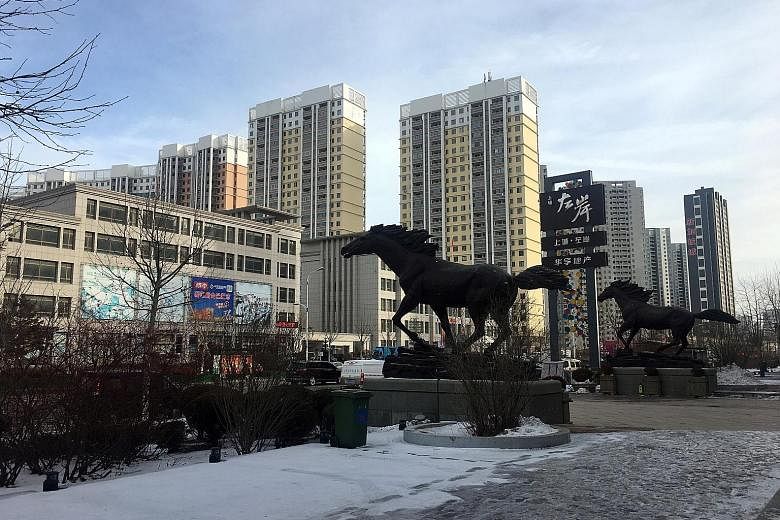DANDONG • As Beijing tightens its grip on trade with North Korea, the economies of Chinese towns along the 1,400km border the two countries share are floundering.
Last Saturday, China said it would ban all coal imports from North Korea, the latest move to enforce United Nations sanctions aimed at depriving Pyongyang of hard currency for its nuclear weapons and ballistic missile programmes.
Hitting back yesterday, the North's state-run KCNA news agency said China was "dancing to the tune" of the United States because of the nuclear and missile programmes, in a rare reproach.
The sanctions have had a wider impact on trade, Chinese residents on the border complain, as North Koreans struggle to finds funds to pay for goods. Even smugglers are feeling the pinch.
"A few of my friends who used to smuggle goods from North Korea have got out of the business in the last two years because it is getting dangerous and not as lucrative," said an owner of an events hall in Kuandian, about 100km north of Dandong, the largest city on the border. "I don't know whether it is related but people are spending less these days. It is getting harder to earn money."
China buys 70 per cent of North Korea's exports and Dandong, the main gateway for trade with the hermit state, is the best place to gauge the impact of the restrictions it has put in force.
Linked to the North Korean city of Sinuiju via the Friendship Bridge, Dandong has boomed in recent years, swept up by speculation that North Korea's leader, Mr Kim Jong Un, will, in time, copy China's export-oriented economic reforms.
More than 1,000 border trading companies set up shop in office complexes overlooking the river while developers flocked to build apartment blocks.
But many of those companies have since folded, residents and traders said. Work on at least two apartment complexes in Dandong has stalled and empty shopfronts are scattered across the city.
"These shops could not carry on because they rely on the North Koreans, and there are fewer North Koreans coming here too," said a trader who wanted to be known only as Mr Jin. He helps North Korean buyers procure goods such as washing machines and construction materials from China.
"Three years ago, we could make a profit of 30 per cent to 40 per cent on an order, now you can't even hope for 20 per cent," said Mr Jin.
It is not in China's interest to ditch its old ally totally.
A sudden regime collapse could throw North Korea into chaos and send hundreds of thousands of North Koreans fleeing across the border, diplomats have said.
But China seems to be increasingly irked by what it sees as Mr Kim's recalcitrance on the nuclear weapons issue.
Saturday's coal ban came after Beijing had announced in April last year that it would stop importing North Korean coal.
But it made exceptions for deliveries intended for "the people's well-being" and not connected to the weapons programmes.
In fact, China bought about 22 million tonnes of coal from North Korea last year, up 15 per cent, with most of it arriving by sea through five ports along China's east coast.
Still, the impact of the April ban has already been felt heavily in Dandong. Local management at state- owned Liaoning Greenland Energy Coal Group, which runs the biggest coal yard in the inland port city, confirmed the suspension of coal shipments, which used to arrive by boat on the Yalu River that separates China from North Korea.
"They have stopped letting in coal since July," said a security guard at the yard, now empty except for two small mounds of coal.
"All the workers were sent home by the company in October.
"Once the government decided, the port stopped allowing in the coal. It is not like we could do anything," added the guard.
REUTERS


